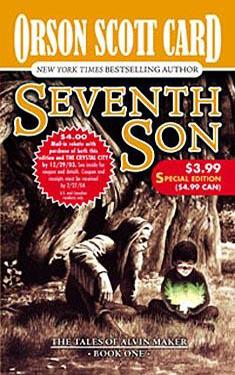Orson Scott Card
Completed 12/19/2021, Reviewed 12/19/2021
1 star
I was looking forward to this book because I liked the two Ender books I read. But I was also dreading this book because of my distaste for the author himself. Upon reading it, I was perplexed. I couldn’t believe this was the same author who wrote Ender’s Game and Speaker for the Dead. This felt like a bad pulp novel from the ‘50s. It’s an alternative early American history with folk religion competing with the different Christian sects. It was choppy, full of exposition, and clearly the beginning of a series. The plot went nowhere. Yet this book won the 1988 Mythopoeic Award and was nominated for several others, including the Hugo. I just don’t get it.
Alvin Miller is the seventh son of a seventh son. This means he’s gifted, special, and possibly even a savior of some sort. He has a “knack” for things, like flawlessly carving stone and commanding cockroaches. His family are homesteaders in the territory of Hio, part of the United States that’s comprised of seven states including one for Native Americans. His mother is Christian, but his father is of the folk religion. His mother drags him to church but his father tries to foster Alvin’s folky talents. A stranger comes through town, known as Taleswapper, to help Alvin understand his gifts as well. On the other hand, the local Christian preacher and Alvin’s brother-in-law try to get the Devil out of him.
I had a lot of problems with this book. The first is that I didn’t like the writing. The characters generally speak in a twangy country dialect. That I could handle. What I didn’t like is that Card popped in and out of using the dialect in the non-dialogue narration. It was very aggravating trying to read all the ain’ts and triple negatives and other cutesy colloquialisms. If it was consistent, as in a first person narration, I think I could have handled it just fine. But this was third person omniscient. It should have been left to the dialogue.
Another thing I didn’t like was that most of the alternative American history was preachy exposition. It stopped the forward momentum of the story telling. I thought it would be interesting, but I generally didn’t like it. It was focused on religion more than politics. And except for George Washington being beheaded for being a traitor to the English and Benjamin Franklin being a wizard, I couldn’t really follow all the details of all the other founding fathers mentioned. They were more like asides than anything integral to the plot. The exception was Franklin, who was Taleswapper’s roommate for a few years.
Then there was the offensive portrayal of non-whites. The Native Americans were called Reds and were obsessed with scalping. Of course, they were also all alcoholics. And I couldn’t believe that Card actually used the offensive term for black children that begins with a P. I think these things turned me off from the book pretty early on.
The characters were mostly one-dimensional. Alvin had some depth, but I had a hard time reading him as a child. While I thought Ender was very well depicted as a child, Alvin’s nature only came through occasionally. Interestingly enough, I thought the Christian minister had more depth than the rest of the characters put together. He struggled with what to do with the Millers and then was in agony over visions he received calling for killing Alvin. I felt for him more than any other character despite his portrayal as one of the bad guys. I also didn’t like the cartoonish names of most of the characters.
I don’t know much about the life of Joseph Smith, but my understanding is that this story parallels his early life, from the bickering parents of different faiths to the broken leg near the end. To me, the parallel wasn’t organic. It felt forced. It’s like Card thought “Hey, I’m going to fantasize Joseph Smith’s life” and clunked his way through it, coming up with scenarios that didn’t flow naturally into a decent story arc.
I was going to give this book two stars, but after writing this review, I dropped it down to one star out of five. The one star is for the details of Alvin coming into his own power and the struggle of the minister. Everything else was mind-numbing or offensive. If I read this book first, I never would have picked up the Ender books. This is Card at his worst and I have no intention of reading any of the other books in this series, despite the homoerotic covers on most of them.

No comments:
Post a Comment